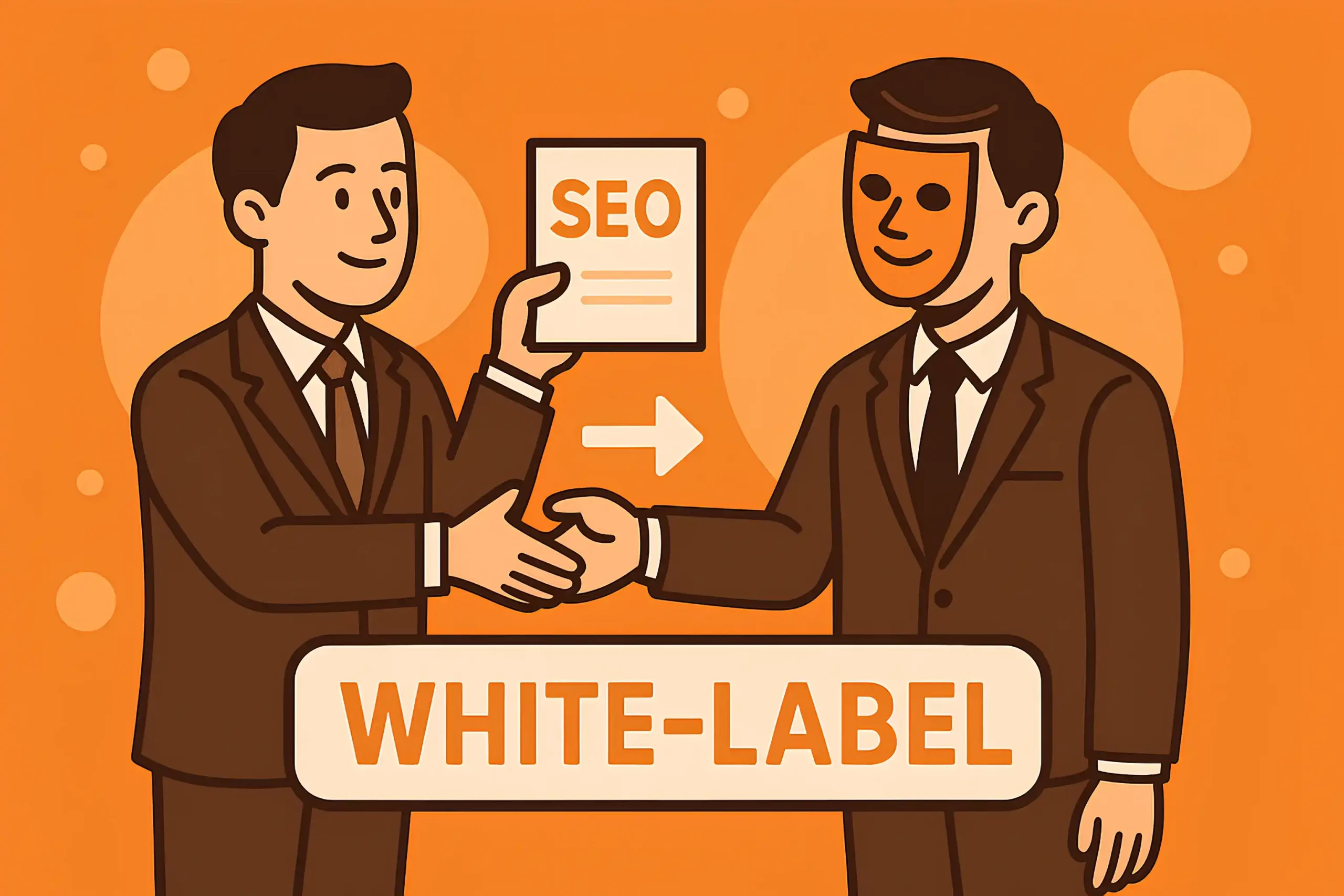Updated January 11, 2026
Enterprise SEO Cost Breakdown for 2026 (Free Calculator Included)
Enterprise SEO typically costs between $5,000 to $25,000+ per month, depending on the scale of your website, the level of competition, and how aggressive your growth goals are. In some complex, multi-language or multi-location setups, costs can increase even higher.
In this guide, I’ll break down what drives the costs, what services you should expect at each pricing tier, and how to tell if you’re overpaying or underinvesting. I’ll also explain why some companies waste thousands on the wrong enterprise SEO, while others turn it into a major advantage.
If you’re leading SEO for a large business or want to get a clear understanding of what it takes (and costs) to compete at scale, this is what most people wish they had from the start.
Quick Overview: How Much Does Enterprise SEO Cost in 2025?
| Service Type | Monthly/One-Time Cost | What's Included | Best For |
|---|---|---|---|
| In-House SEO Team | $10,000 – $40,000+ / month | Salaries, tools, full-time staff, strategy, content, link-building | Enterprises with large budgets & internal control |
| Enterprise SEO Agency | $5,000 – $25,000+ / month | Full-service SEO, technical audits, content, link-building, support | Companies needing deep expertise & scalability |
| Hybrid (In-House + Agency) | $12,000 – $50,000+ / month | Shared workload, consulting, strategic execution | Teams wanting both control and outside firepower |
| White Label SEO | $3,000 – $20,000+ / month | Fulfillment of SEO under your brand, including content & links | Agencies or consultants needing invisible support |
| Outsourced SEO (Freelancers) | $3,000 – $10,000+ / month | Flexible SEO tasks: content, links, audits, technical help | Brands or small teams needing flexible help |
| One-Time Enterprise SEO Audit | $3,000 – $15,000+ one-time | Deep technical/content audit, issue detection, strategic roadmap | Enterprises needing a snapshot of SEO health |
One-Time Enterprise SEO Audits
An enterprise SEO audit typically costs between $3,000 and $15,000 or more, depending on several factors. Unlike basic audits, enterprise-level audits dive deep into thousands or sometimes millions of URLs, making them more resource-intensive.
The final cost usually depends on the size and complexity of your site, whether it’s multilingual, multi-regional, or has dozens of subdomains. The more complex the architecture, the more time and expertise it takes to audit it properly.
If you’re also interested in understanding SEO audit costs in more detail, check out my complete guide on SEO audit pricing for a full breakdown.
Monthly Retainers for Ongoing SEO
For most enterprise companies, a monthly SEO retainer typically ranges from $5,000 to $25,000 or more, depending on the scale, complexity, and scope of the campaign. For example, large eCommerce platforms, SaaS companies, or global brands targeting multiple countries may even see retainers crossing $30,000/month, especially if technical SEO services, content production, link-building, and analytics are all included.
The price can be on the lower end when the needs are more focused; for example, technical oversight or local visibility improvements for a single brand or country. But if your site has millions of URLs, is built on a complex CMS, or you’re targeting international audiences in different languages, then expect higher retainers.
Some enterprises consider building an internal SEO team instead (I understand them). I think that’s great for control and fast execution, but in most cases, it turns out to be more expensive, not just in salaries, but tools, training, and onboarding.
On the other hand, a fractional SEO consultant or boutique agency can bring deep strategic input without the full-time cost, often collaborating closely with your marketing or dev team.
Hourly Rates for Specialized Consulting
If you’re looking for deep, strategic SEO input without committing to a full retainer, hiring an enterprise SEO consultant on an hourly basis is another great option. Most experienced enterprise-level SEO consultants charge between $150 to $500 per hour, with top-tier specialists, those who’ve worked with global brands or managed large-scale SEO website migrations, sometimes charging more.
I believe hourly consulting is often best when you need targeted help. For example, if your team needs guidance on a specific technical SEO issue, like crawl budget optimization for a 500k+ page eCommerce site, or if you’re preparing for a major website migration or international expansion. You can also use hourly consulting for auditing existing strategies, validating your in-house efforts, or reviewing a strategy before a big launch.

Especially, in enterprise eCommerce SEO, hourly consulting is often valuable. A seasoned consultant can help you avoid common traps like category cannibalization, thin product page content, or pagination issues, and these insights often save you thousands in lost traffic or missed sales opportunities.
I mean, hourly SEO isn’t ideal for implementation-heavy tasks or long-term campaigns. If you expect the consultant to manage execution, reporting, and link-building, a monthly retainer or project-based agreement is a better option (IMO).
Internal vs Outsourced SEO Budget Comparisons
Enterprise companies often struggle with one of the most common SEO decisions: should we build an in-house SEO team or outsource the work to an agency or consultant? From a budget perspective, here’s what I would say:
Hiring an internal SEO team typically means budgeting for at least $200K to $400K+ per year. This often includes one senior SEO lead ($100K–$180K), one or two SEO specialists or content strategists ($60K–$90K each), and sometimes support from developers or analysts. Don’t forget overhead, management time, training, tools, and benefits. There are a lot of extra costs, especially if you’re targeting international markets, managing multiple websites, or millions of URLs.
| Factor | In-House SEO Team | Outsourced SEO (Agency or Freelancer) | Hybrid (In-House + Agency) |
|---|---|---|---|
| Monthly Cost | $10,000 – $40,000+ | $3,000 – $10,000+ | $12,000 – $50,000+ |
| Resources | Full-time staff, tools, salaries, overhead | On-demand experts, no overhead costs | Internal control with external specialization |
| Flexibility | Limited by internal bandwidth and hiring speed | High flexibility; scale up/down based on workload | Moderate; strategic alignment needed between both teams |
| Best For | Large enterprises with control & long-term vision | Small to mid-sized brands needing expertise without hiring | Scaling teams that need both agility and in-house involvement |
By contrast, outsourcing SEO to an enterprise-focused agency usually ranges from $5,000 to $25,000+ per month, depending on scope, deliverables, and the level of involvement. Some brands also use a hybrid approach, keeping a small in-house team (or a single SEO manager) and outsourcing execution, SEO audit services, or enterprise link-building, which is cost-effective and flexible.
So which one makes sense?
If you need speed, diverse skill sets, and broad execution capacity, SEO outsourcing might save you more time and money. A good agency already has systems, experience with large sites, and access to premium tools; no need to build the infrastructure from scratch.
But if you’re looking for long-term integration, control, and SEO to be part of your core digital marketing strategy, building an internal team is sometimes more strategic, especially if SEO ties directly into product or engineering decisions.
Top Factors That Influence Enterprise SEO Pricing
If you’ve already checked out my SEO pricing guide, you’ll know the general factors that influence SEO costs, things like website size, goals, and service scope. But enterprise SEO pricing is a different challenge. Here, we’re dealing with far more complexity, more moving parts, and higher expectations.
So, in this section, I’m focusing on the factors that specifically affect enterprise-level SEO pricing, especially for large organizations and high-stakes markets.
First things first, some industries are very competitive. If you’re in finance, healthcare SEO, or SaaS, in most cases, you’re fighting against brands with million-dollar SEO budgets. Competing here requires deeper research, better content, and PR backlinks. Naturally, the more cutthroat your vertical, the more you’ll spend to outperform.
Next, if your site targets different regions (e.g., US, UK, DE) or is available in multiple languages, that’s a huge multiplier. Enterprise websites often have regional content strategies, or even country-specific domains or subfolders; each requiring custom optimization, localized keyword research, and CMS/tech structure considerations.

If your company already has an internal SEO team or marketing stakeholders, the external provider’s role may shift. Some clients need execution. Others want strategy, QA, and advanced support. The more stakeholders involved, the more time is spent on alignment, documentation, and communication.
Example: For one enterprise client, weekly syncs, shared Notion boards and stakeholder approval stuff added over 25% more project time, which affects pricing.
Here are some more factors:
Established brands with media coverage or existing PR campaigns may need less link-building effort to earn backlinks.
On the other hand, if you’re a new enterprise with no press presence, link acquisition can become expensive and time-consuming, especially for white-hat outreach.
SEO is naturally long-term, but not everyone wants to wait. If your enterprise needs results in 6 months instead of 18, the workload compresses.
You’ll need more hands, faster content development, and aggressive link-building.
If your site has suffered from past penalties, migrations, or outdated SEO practices, the audit and cleanup process may take longer.
How to Outsource Enterprise SEO: Cost and ROI Expectations
Outsourcing enterprise SEO is never just about “getting help.” It’s about finding a long-term strategic partner like Digital World Institute, which understands how your business works, aligns with your internal teams, and is equipped to handle complex technical, content, and authority-building challenges at scale.
So, before you outsource, there are differences you need to know between freelancers, agencies, SEO coaches, and enterprise consultants; each comes with its pricing structure, level of involvement, and long-term ROI implications.
For example, if you’re considering freelancers, the appeal is obvious; lower upfront costs and flexibility. But unless you find someone with deep enterprise experience, you’re likely to hit capacity limitations quickly. A solo consultant can only handle some moving parts: technical audits, stakeholder reporting, strategy refinement, etc.
In contrast, boutique SEO agencies may offer highly personalized services and faster communication, while large enterprise agencies bring dedicated teams, project managers, and pre-built processes, but also, sometimes, slower decision-making and inflexible packages.
Coaches or SEO mentors, on the other hand, are best for companies with an in-house team looking for strategic direction. They don’t execute; they guide.
How Top SEO Agencies Price Their Enterprise Services
Top-tier SEO agencies tend to price based on scope, deliverables, and velocity. For example:
Are you asking for just audits and technical recommendations or full implementation across 15 product categories and 7 country-specific domains?
Will they handle content creation, CRO, analytics integration, or just on-page optimizations?
Do you want to hit targets in 6 months or are you okay with a gradual 18-month plan?
Most high-end agencies charge monthly retainers ranging from $5,000 to $25,000+, depending on your needs, but project-based contracts (like $20,000–$50,000 audits or migrations) are also common.
Best practice: Always request a custom scope of work. If they offer you a templated $10k/month package before fully understanding your site, forget about them.
Remember, even with clearly outlined proposals, sometimes there are some hidden costs. For example, some agencies offer audits but charge separately to implement fixes or validate releases, or if your team requires enablement guides, internal SEO SOPs, or process walk-throughs, those are often billed separately.
ROI Benchmarks: When Does It Pay Off?
Enterprise SEO services don’t pay off in weeks, and any agency saying otherwise is selling fantasy. For most businesses, SEO ROI typically starts to show in 4–6 months, but the real impact kicks in after 9–12 months.
Some specific ROI indicators to track:
- Increased non-branded traffic to key product or service pages
- Growth in rankings for mid- and bottom-funnel keywords
- Higher conversion rates from organic due to CRO-informed content
- More inbound PR or link acquisition opportunities through brand visibility
How to Evaluate If You’re Paying the Right Price
One of the craziest parts of enterprise SEO is figuring out whether you’re paying the right amount, not just paying. A $5K monthly package might sound expensive to a mid-sized business, but for an enterprise site with hundreds of pages, multiple teams involved, and aggressive growth objectives, it might hardly make a difference.
Meanwhile, a $50K/month retainer should come with serious stuff, including dedicated strategists, technical audits, content teams, link acquisition experts, CRO support, and advanced analytics dashboards.

Next, if you’re paying top-tier prices and getting basic reporting or unclear wins, you’re likely overpaying. High-ticket SEO should result in significant outcomes: traffic from the right segments, visible improvements in rankings for difficult keywords, and tangible content or technical execution.
When your SEO objectives evolve (expanding internationally, entering a new vertical, launching new products), it often justifies increasing the budget. But if your market is stable and you’re simply maintaining visibility, you might be able to renegotiate or reduce without hurting performance.
How Enterprise SEO Budgets Are Structured
Most enterprise companies don’t treat SEO separately; they plan it together with paid ads, PR, and product marketing. In Fortune 500 companies, it’s not uncommon for SEO to receive only 10–20% of the total digital marketing budget, with paid advertising still dominating.
But this is slowly changing as more data proves SEO’s long-term ROI and cumulative effect. In industries like SaaS, finance, and healthcare, SEO often commands 30–40% of the digital mix, especially when CAC is high in paid channels.

For monthly vs quarterly planning, SEO budgets are usually set on an annual or semi-annual basis, but execution is often reviewed and adjusted every quarter. More advanced teams use rolling forecasts, especially when SEO is tied to product releases, seasonal demand, or international rollout.
Monthly planning is more tactical: focused on initiatives, campaigns, or site changes, whereas quarterly models are ideal for adjusting high-level priorities and identifying budget shifts between content, tech, and link-building.
Curious about how much link-building alone might cost you? I also put together a detailed guide on link-building costs that you can check out right now.
How to Allocate Across Content, Tech, and Links
A smart enterprise SEO budget allocation usually follows a three-way split across on-page SEO, content strategy, and link acquisition. For newer enterprise websites or post-migration phases, technical audits and fixes take priority. As the foundation stabilizes, content starts to eat a bigger slice, especially if you’re targeting informational queries or expanding linkable assets.
Link-building, particularly for hard-to-rank commercial pages, often runs in parallel but increases during product launches or competitive campaigns. A common split we’ve seen in mature setups: 30% technical, 40% content, 30% off-page, but it depends on priorities.
What’s the Cost of White-Label Enterprise SEO?
The cost of white-label enterprise SEO typically ranges from $3,000 to $20,000+ per month, depending on the scope, deliverables, and niche complexity. For example, if you’re reselling basic audits, content, and a handful of links, you might pay around $3K–$5K monthly. But for fully managed SEO campaigns, including on-page SEO services, ongoing content production, international SEO, CRO recommendations, and high-authority link-building, costs can easily hit $10K to $30K+, depending on how hands-off your agency wants to be. If you’re offering white-label SEO services under your brand, be sure the provider uses custom strategies and is transparent about the costs.
To learn more about what impacts cost, check out our white-label SEO pricing guide.
How Long Should a Typical Enterprise SEO Contract Be?
A typical enterprise SEO contract usually ranges from 6 to 12 months, with some extending to 18 months or more for complex international or multi-domain campaigns. However, committing to a long-term contract isn’t always the best option for every business. If you’re unsure about long-term fit or still evaluating ROI potential, no-contract SEO is another great option. It gives you the flexibility to test the agency’s capabilities without being locked in, while still benefiting from expert guidance.
Is Performance-Based SEO a Good Option for Enterprises?
No! Instead of focusing on what’s easiest to rank, a reliable partner should focus on what makes sense for your business. That’s why, in many cases, it’s better to hire an SEO agency with proven experience in enterprise strategy and transparent deliverables, not just rankings.
I mean, hybrid models do exist. Some agencies offer a base retainer with performance bonuses. If you’re exploring performance-based SEO, make sure the agreement defines meaningful KPIs that allow you to maintain full access and control over your assets.









